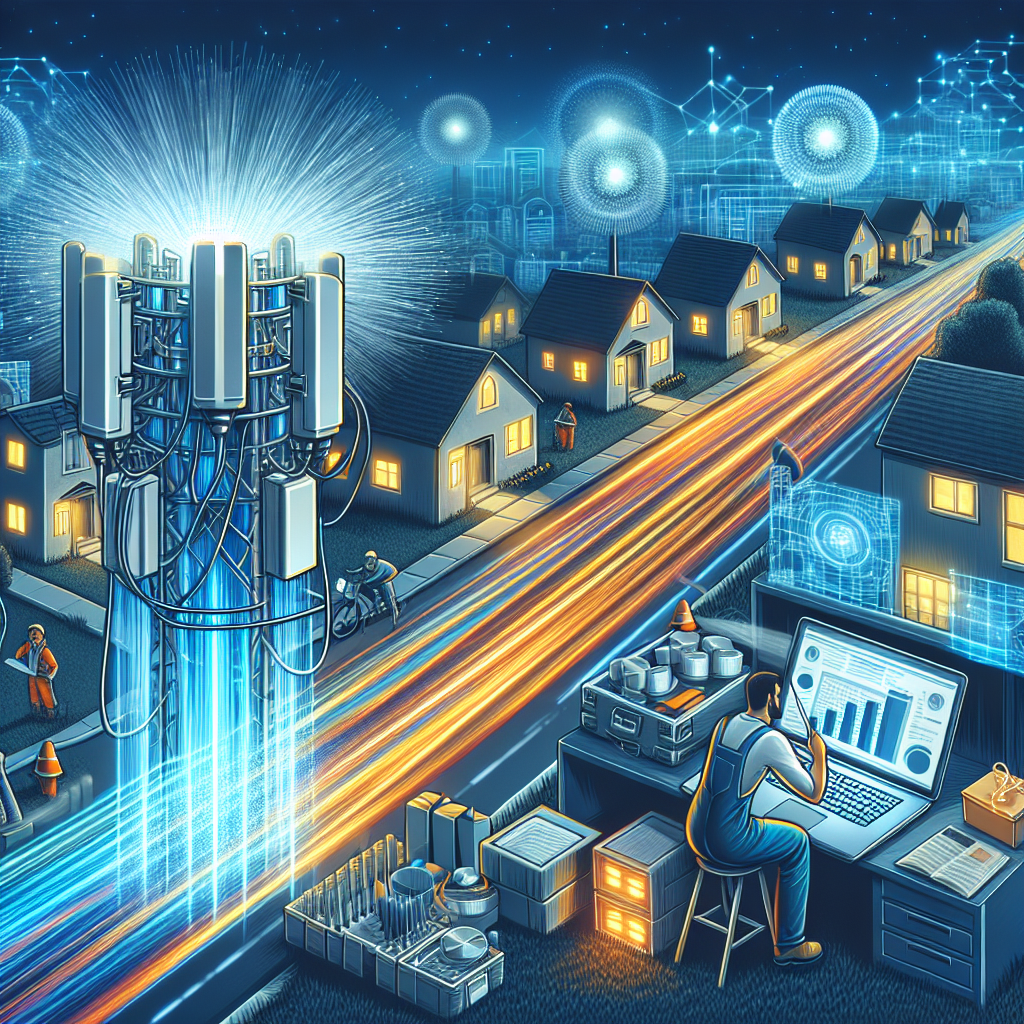In today’s world of high-speed internet, local internet service providers are stepping up their game by offering lightning-fast gigabit speeds to their customers. With the demand for ultra-fast internet increasing every day, these providers are pulling out all the stops to deliver a browsing experience like never before. From fast downloads and seamless streaming to lag-free gaming, gigabit speeds are transforming the way we connect and communicate online. Join us as we delve into the world of local internet service providers who are paving the way for a faster, more connected future. Get ready to experience the fast lane like never before!
The Rise of Gigabit Internet Services
In the modern digital landscape, the term “gigabit speeds” refers to internet connections that can transmit data at a rate of 1 gigabit per second, or 1,000 megabits per second. This exponential increase in speed has revolutionized the way individuals and businesses access and utilize the internet, enabling seamless streaming, rapid downloads, and enhanced connectivity across devices.
Definition of Gigabit Speeds:
Gigabit internet services have become synonymous with lightning-fast connectivity, allowing users to upload and download large files in a matter of seconds, stream high-definition content without buffering, and engage in real-time online activities with minimal latency. This significant leap in speed has paved the way for innovative technologies such as virtual reality, 4K video streaming, and cloud-based services that require robust and reliable internet connections.
Increasing Demand for Faster Internet Connections:
As the digital landscape continues to evolve, the demand for faster internet connections has surged exponentially. With the proliferation of smart devices, the rise of remote work and virtual learning, and the growing popularity of online gaming and streaming platforms, consumers and businesses alike are seeking high-speed internet solutions that can support their bandwidth-intensive activities.
Local Internet Service Providers (ISPs) have recognized this growing need for speed and have been at the forefront of delivering gigabit internet services to meet the demands of their customers. By investing in advanced infrastructure, upgrading network capabilities, and leveraging cutting-edge technologies such as fiber-optic cables and DOCSIS 3.1, these ISPs have made gigabit speeds more accessible and affordable for residential and commercial users alike.
Understanding Local Internet Service Providers (ISPs) Offering Gigabit Speeds

What sets local ISPs apart from larger providers
Local Internet Service Providers (ISPs) stand out from their larger counterparts in several key ways, showcasing a more community-oriented approach and a greater ability to tailor their services to local needs. These distinctions play a significant role in the delivery of gigabit speeds to customers, highlighting the advantages of choosing a local provider over a larger, more corporate entity.
-
Emphasizing personalized service and community engagement: One of the primary factors that differentiate local ISPs is their emphasis on personalized service and genuine community engagement. Unlike larger providers that may struggle to maintain a personal connection with their customers, local ISPs often prioritize building relationships within the communities they serve. This personalized approach allows them to better understand the unique needs and preferences of their customers, leading to more customized solutions and a higher level of customer satisfaction.
-
Flexibility in adapting to local infrastructure and needs: Another key aspect that sets local ISPs apart is their flexibility in adapting to local infrastructure and needs. While larger providers may have a one-size-fits-all approach that can be limiting in certain areas, local ISPs have the advantage of being more nimble and responsive to the specific challenges and opportunities presented by the local environment. This adaptability enables them to leverage existing infrastructure more effectively, implement innovative solutions tailored to local requirements, and ultimately deliver gigabit speeds with greater efficiency and reliability.
Challenges faced by local ISPs
- Infrastructure limitations in providing gigabit speeds
- Local ISPs often encounter challenges related to outdated infrastructure that cannot support gigabit speeds.
- Upgrading existing infrastructure to fiber-optic cables or other advanced technologies requires significant financial investments.
- In rural areas, the lack of infrastructure development further hinders the delivery of gigabit speeds to residents.
-
Overcoming these infrastructure limitations necessitates strategic planning and collaboration with local authorities.
-
Competing against larger ISPs with extensive resources
- Local ISPs face stiff competition from larger internet service providers that have more resources and established networks.
- Smaller ISPs may struggle to match the marketing and advertising budgets of their larger counterparts, making it challenging to attract customers.
- Building brand recognition and trust in the community is crucial for local ISPs to compete effectively with bigger players.
- Differentiating their services through personalized customer support and tailored packages can help local ISPs carve out a niche in the market.

Exploring the Technology Behind Gigabit Internet
Fiber-optic networks
Fiber-optic networks serve as the backbone for delivering gigabit speeds to consumers, revolutionizing the landscape of internet connectivity. Through the use of thin strands of glass or plastic known as fiber-optic cables, data can be transmitted at incredibly high speeds using pulses of light. This technology allows for significantly faster and more reliable internet connections compared to traditional copper wire networks.
How fiber-optic cables enable gigabit speeds
Fiber-optic cables have the ability to carry a vast amount of data due to the physics of light transmission. Unlike electrical signals in copper wires that can experience interference and signal degradation, light pulses in fiber-optic cables are immune to electromagnetic interference and can travel over long distances without losing strength. This characteristic enables internet service providers to offer gigabit speeds to their customers, as the capacity for data transmission is virtually unlimited.
Benefits of fiber-optic technology for internet connectivity
The utilization of fiber-optic technology in internet infrastructure brings forth a multitude of benefits for end-users. Gigabit speeds allow for seamless streaming of high-definition content, fast downloads and uploads, and lag-free online gaming experiences. Additionally, fiber-optic networks are more energy-efficient and environmentally friendly compared to traditional copper wire networks, making them a sustainable choice for high-speed internet access. Overall, the implementation of fiber-optic technology marks a significant advancement in the delivery of internet services, paving the way for a future of ultra-fast connectivity.
Other technologies used by ISPs for gigabit speeds
Exploring the Technology Behind Gigabit Internet
In the quest to provide gigabit speeds, local Internet Service Providers (ISPs) are leveraging various technologies to meet the increasing demand for high-speed internet connectivity. Apart from fiber optics, ISPs are also utilizing cable internet advancements and fixed wireless solutions to deliver gigabit speeds to their customers.
Cable Internet Advancements
- DOCSIS 3.1 Technology: One of the key advancements in cable internet technology is the implementation of Data Over Cable Service Interface Specification (DOCSIS) 3.1. This technology allows ISPs to transmit data at much higher speeds over existing cable infrastructure, enabling gigabit speeds without the need for extensive network upgrades.
- Upgraded Hardware: ISPs are investing in upgraded cable modems and routers that are compatible with DOCSIS 3.1 technology. These devices can handle the increased data throughput required for gigabit internet speeds, providing customers with a seamless and reliable connection.
Fixed Wireless Solutions for High-Speed Internet Access
- Point-to-Point Wireless Links: ISPs are deploying point-to-point wireless links to connect customers to their network infrastructure. By utilizing high-frequency radio waves, these wireless solutions can achieve gigabit speeds over short distances, offering a cost-effective alternative to traditional wired connections.
- 5G Technology: The rollout of 5G technology is also driving the adoption of fixed wireless solutions for gigabit internet access. With its high bandwidth and low latency capabilities, 5G networks enable ISPs to deliver ultra-fast speeds to residential and business customers in areas where fiber optic deployment may be challenging.
By embracing these innovative technologies, local ISPs are expanding their gigabit internet offerings, providing customers with faster and more reliable connectivity options in an increasingly digital world.
Benefits of Gigabit Internet for Consumers
-
Enhanced online experiences with faster download and upload speeds: Gigabit internet services provide consumers with lightning-fast speeds, allowing for seamless streaming of high-definition content, lag-free online gaming, and quick downloads of large files. With gigabit speeds, buffering becomes a thing of the past, and users can enjoy a smooth online experience without delays or interruptions.
-
Support for multiple devices and bandwidth-intensive activities: Gigabit internet is ideal for households with multiple internet-connected devices, as it can easily handle the demands of simultaneous streaming, gaming, video conferencing, and more. This high-speed connection ensures that each device receives ample bandwidth, preventing slowdowns or lags even during peak usage times. Additionally, gigabit internet enables users to engage in bandwidth-intensive activities such as 4K streaming, virtual reality gaming, and large file transfers with ease.
Factors to Consider When Choosing a Local ISP Offering Gigabit Speeds
Pricing and service packages
When considering a local Internet Service Provider (ISP) that offers gigabit speeds, pricing and service packages play a crucial role in decision-making. Here are some key factors to consider when evaluating the pricing and service packages of different providers:
-
Comparing costs: It is essential to compare the costs of gigabit speed packages offered by various local ISPs. While some providers may offer competitive pricing for their gigabit plans, others may have higher rates due to the premium nature of ultra-fast speeds. Conducting a thorough cost analysis can help determine the most cost-effective option that aligns with your budget and usage needs.
-
Available plans: Local ISPs may offer a range of gigabit speed plans with varying features and benefits. Some providers may have basic gigabit packages that include just the high-speed internet service, while others may bundle additional services such as TV streaming, home phone, or security features. Assessing the available plans from different providers can help you choose a package that not only meets your need for speed but also offers value-added services that enhance your overall internet experience.
-
Customer support and reliability: In addition to pricing, it is essential to consider the level of customer support and reliability offered by the ISP. Fast gigabit speeds are only beneficial if the service is consistently reliable and backed by responsive customer support. Researching customer reviews, uptime statistics, and technical support options can provide insight into the service quality of each provider. Opting for an ISP with a reputation for excellent customer service and reliable connectivity can ensure a smooth experience when enjoying gigabit speeds for your internet usage needs.
Coverage and availability
When considering a local Internet Service Provider (ISP) that offers gigabit speeds, one of the primary factors to evaluate is the coverage and availability of their services in your area. Here are some key points to keep in mind:
- Checking the availability of gigabit services in your area: Before committing to a particular ISP, it is crucial to verify if they indeed provide gigabit speed internet in your locality. This can typically be done by visiting the ISP’s website or contacting their customer service to inquire about service availability at your specific address.

– Understanding the reach and expansion plans of local ISPs: In addition to current coverage, it is essential to delve into the expansion plans of local ISPs regarding gigabit services. Some ISPs may be in the process of rolling out gigabit infrastructure to more areas, while others may have already established widespread coverage. Knowing the growth trajectory of an ISP can help you make an informed decision based on future service availability.
The Future of Gigabit Internet Services
As technology continues to advance at a rapid pace, the future of gigabit internet services holds great promise for consumers and businesses alike. Local Internet Service Providers (ISPs) are at the forefront of delivering gigabit speeds to meet the growing demand for high-speed internet access. Here are some anticipated developments in gigabit internet technology:
-
Fiber Optic Expansion: One of the key drivers of gigabit internet speeds is the expansion of fiber optic networks. Fiber optic cables can transmit data at incredibly high speeds, making them ideal for delivering gigabit internet services to homes and businesses. Local ISPs are investing in expanding their fiber optic infrastructure to provide faster and more reliable internet connections.
-
5G Technology: The rollout of 5G technology is set to revolutionize the way we access the internet. With speeds that rival traditional wired connections, 5G networks have the potential to deliver gigabit speeds wirelessly. Local ISPs are exploring the deployment of 5G networks to offer ultra-fast internet services to their customers.
-
Internet of Things (IoT): The proliferation of IoT devices is driving the need for faster internet speeds. From smart homes to connected cars, the IoT ecosystem relies on high-speed internet connectivity to function effectively. Local ISPs are gearing up to support the increasing number of IoT devices by providing gigabit internet services that can handle the demands of a connected world.
In conclusion, the future of gigabit internet services looks promising with advancements in fiber optic technology, the rollout of 5G networks, and the growth of the Internet of Things. Local ISPs are playing a crucial role in delivering gigabit speeds to meet the evolving needs of consumers and businesses in an increasingly digital world.
FAQs
What is gigabit speed internet?
Gigabit speed internet refers to an internet connection with speeds of 1 gigabit per second, which is equivalent to 1,000 megabits per second. This ultra-fast connection allows for incredibly quick downloads and uploads, seamless streaming of high-definition content, and smooth online gaming experiences.
How are local internet service providers able to offer gigabit speeds?
Local internet service providers offering gigabit speeds have made significant investments in upgrading their infrastructure with fiber-optic technology. Fiber-optic cables transmit data using light signals, allowing for much faster speeds compared to traditional copper cables. By investing in fiber-optic networks, these providers are able to deliver gigabit speeds to their customers.
Are there any limitations to receiving gigabit speed internet?
While gigabit speed internet offers blazing fast speeds, there are some limitations to consider. One factor that can affect your actual internet speed is the type of device you are using to connect to the internet. Older devices may not be able to take full advantage of gigabit speeds. Additionally, the speed at which websites and servers can send and receive data can also impact your overall internet speed.
How can I sign up for gigabit speed internet with a local internet service provider?
If you are interested in signing up for gigabit speed internet with a local internet service provider, you can typically check their website or contact their customer service team to inquire about availability in your area. Some providers may require a specialized modem or router to support gigabit speeds, so make sure to confirm any necessary equipment before signing up.


